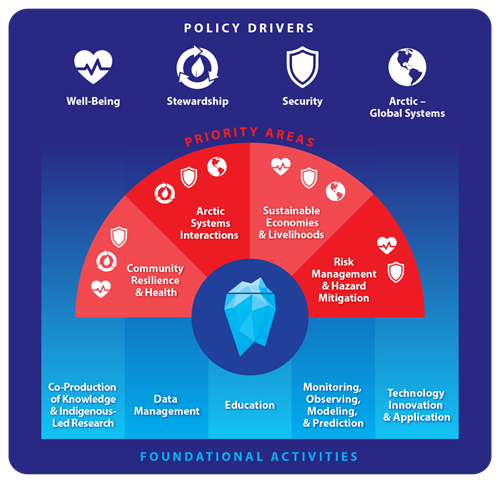By: Liz Weinberg, Web Manager and Community Coordinator, Interagency Arctic Research Policy Committee
On 9 March 2021, the Interagency Arctic Research Policy Committee (IARPC) released a draft of the 2022–2026 Arctic Research Plan. The plan identifies priorities for US interagency collaboration and partnerships that will increase the value of the federal research investment in the Arctic and for Arctic residents. It addresses the most pressing Arctic research needs that require a collaborative approach and that can advance understanding of the Arctic, inform policy and planning decisions, and promote the well-being of Arctic and global communities.
IARPC is now asking the public to comment on the plan. Comments may be submitted via the Federal Register Notice; emailed to IARPCPlan [at] nsf.gov; mailed to Roberto Delgado, Office of Polar Programs, National Science Foundation, 2415 Eisenhower Avenue, Alexandria, Virginia 22314; or left as voicemail by calling 703-783-1658 or 888-657-7759 (toll free). We are specifically seeking input on priority area goals, justifications, and potential partners; the foundational activities; and the implementation and metrics for measuring success. Please submit comments by 11 June 2021.
Every five years, IARPC is required by law to prepare and execute an Arctic Research Plan. The draft Arctic Research Plan 2022–2026 responds to challenges identified by Arctic communities, federal departments and agencies, the state of Alaska, and other non-federal partners.

The plan builds on four critical policy drivers in US research policy that reflect long-standing national interests in the Arctic and the collective priorities of federal agencies. These drivers include well-being, stewardship, security, and Arctic-global systems. It also identifies four priority areas: community resilience and health, Arctic systems interactions, sustainable economies and livelihoods, and risk management and hazard mitigation. These priority areas are areas of broad cross-cutting focus that exemplify the complex interactions between human, societal, and environmental challenges.
In addition to identifying four priority areas, this plan identifies five foundational activities: co-production of knowledge and Indigenous-led research; data management; education; monitoring, observing, modeling, and prediction; and technology innovation and application. These activities have been identified as essential tools to support a robust and impactful federal research program. They are critical to achieving the priority area goals outlined in the plan and will remain foundational to Arctic research beyond the five-year duration of this plan.
In contrast to previous IARPC Arctic research plans, this draft plan presents a high-level strategy without explicit direction on implementation. In order for IARPC to respond more swiftly to emerging or immediate needs while continuing to support US Arctic policy, this plan will be implemented through biennial implementation plans. These implementation plans will identify specific objectives, deliverables, and metrics. Development of the first biennial implementation plan will begin in the near future.
IARPC would like to express its appreciation to the Arctic research community, Arctic residents, the State of Alaska, and others who committed time, effort, and expertise that supported the development of the draft plan. You can download the draft plan, learn about the plan development process, and access a media kit. If you have any questions, please contact the IARPC Secretariat at plan [at] iarpccollaborations.org.
About the Author
 Liz Weinberg (she/her) joined IARPC as the web manager and community coordinator in 2020. She previously served as the digital outreach coordinator and writer/editor for NOAA's Office of National Marine Sanctuaries, where she focused on increasing public engagement in and awareness of marine protected areas. Liz has a background in science communication and writing: she holds an MFA in creative writing from the University of Washington, and is at work on a book of essays about climate change, wilderness, and queerness. She is based in unceded Multnomah (Chinook) and Stl'pulmsh (Cowlitz) lands / Portland, Oregon.
Liz Weinberg (she/her) joined IARPC as the web manager and community coordinator in 2020. She previously served as the digital outreach coordinator and writer/editor for NOAA's Office of National Marine Sanctuaries, where she focused on increasing public engagement in and awareness of marine protected areas. Liz has a background in science communication and writing: she holds an MFA in creative writing from the University of Washington, and is at work on a book of essays about climate change, wilderness, and queerness. She is based in unceded Multnomah (Chinook) and Stl'pulmsh (Cowlitz) lands / Portland, Oregon.
